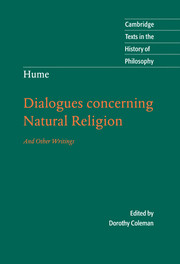Book contents
- Frontmatter
- Contents
- Acknowledgments
- Introduction
- Chronology
- Further reading
- Note on the text
- List of abbreviations
- DIALOGUES CONCERNING NATURAL RELIGION
- OTHER WRITINGS
- From Hume's memoranda
- Fragment on evil
- Letter to Francis Hutcheson, March 16, 1740 (extract)
- Letter to William Mure, June 30, 1743 (extract)
- Letters to Gilbert Elliot (extracts)
- From The Natural History of Religion
- Selections from Bayle
- Index
- Cambridge Texts in the History of Philosophy
Selections from Bayle
Published online by Cambridge University Press: 05 June 2012
- Frontmatter
- Contents
- Acknowledgments
- Introduction
- Chronology
- Further reading
- Note on the text
- List of abbreviations
- DIALOGUES CONCERNING NATURAL RELIGION
- OTHER WRITINGS
- From Hume's memoranda
- Fragment on evil
- Letter to Francis Hutcheson, March 16, 1740 (extract)
- Letter to William Mure, June 30, 1743 (extract)
- Letters to Gilbert Elliot (extracts)
- From The Natural History of Religion
- Selections from Bayle
- Index
- Cambridge Texts in the History of Philosophy
Summary
Bayle on materialism vs intelligent design
§CVI
Whether the opposing argument which the Stratonician atheists could fashion from the argument drawn from the order and symmetry of the world could not have embarrassed the pagan philosophers.
To spare you useless toil, I am warning you of one thing which is absolutely necessary if you want to use the proof which first comes to mind and which is basically most excellent, namely that founded on the beauty and regularity of the heavens and on the remarkable ingenuity of animal machines, in which one can clearly see that their parts are directed toward particular ends and are made to work together. Those Athenians whom we suppose to adhere to the system of Strato were obliged to say that a lifeless and unconscious nature produced all these beautiful works and that, without knowing what it was doing, arranged them with a symmetry and interdependence which clearly seem to be caused by a very enlightened intelligence, deliberately choosing both its ends and its means. Exactly here, you say, lies an objection or difficulty which would have cured the atheism of those folks to the extent that the depravity of their will allowed them to seek their understanding's cure. With this proposal you are inaugurating a very lovely race course for yourself, where you may run as many races or perform as many promenades as you please; but if you wish to profit from these exercises you must insert the condition I am about to point out into your plan.
- Type
- Chapter
- Information
- Hume: Dialogues Concerning Natural ReligionAnd Other Writings, pp. 137 - 152Publisher: Cambridge University PressPrint publication year: 2007

